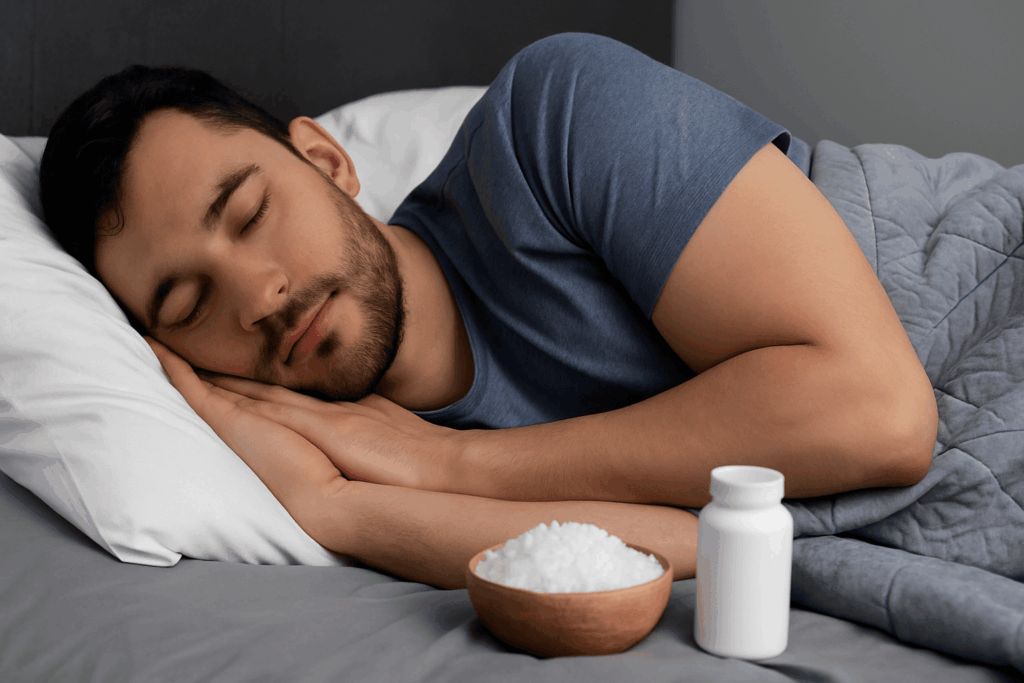Magnesium and Sleep – Explore the Relationship

Magnesium and sleep relationship is a very widely researched and discussed topic for the past few years! If you’ve ever found yourself staring at the ceiling at 3 AM, you’re certainly not alone. With an estimated one-third of adults experiencing sleep difficulties regularly, the search for natural sleep solutions has never been more relevant. Among the various remedies gaining attention, magnesium supplements have emerged as a promising option for those seeking better sleep without the grogginess or dependency associated with conventional sleep medications.
But does magnesium truly help you sleep better? Let’s examine the science behind this essential mineral and its relationship with sleep to determine whether adding it to your nightly routine might be worthwhile.
Understanding Magnesium’s Role in Sleep
Magnesium is an essential mineral that plays a crucial role in over 300 biochemical reactions in the body, including many that influence sleep quality and duration. While researchers are still uncovering the exact mechanisms, several key pathways have been identified that explain magnesium’s potential sleep-enhancing effects.
The Science Behind Magnesium and Sleep
Magnesium appears to influence sleep through multiple pathways:
- Neurotransmitter regulation: Magnesium helps regulate neurotransmitters that are directly related to sleep. As Dr. Umeda from Cleveland Clinic explains, magnesium acts as an antagonist to the N-methyl-D-aspartate (NMDA) receptor, which helps quiet the nervous system and prepare for sleep.
- GABA activation: Research suggests that magnesium enhances the activity of gamma-aminobutyric acid (GABA), the primary inhibitory neurotransmitter in your brain that promotes relaxation and sleep.
- Melatonin regulation: Magnesium is involved in the production of melatonin, the hormone responsible for regulating your sleep-wake cycle. Adequate magnesium levels may support proper melatonin synthesis, helping maintain healthy circadian rhythms.
- Muscle relaxation: Magnesium’s role in muscle relaxation may reduce physical tension that can interfere with falling asleep. This might be particularly beneficial for those who experience restless legs syndrome or muscle cramps at night.
- Stress reduction: By modulating the body’s stress response system, magnesium may help lower cortisol levels, potentially making it easier to unwind and fall asleep.
What Does the Research Say?
The scientific evidence for magnesium’s sleep benefits is emerging, with several studies showing promising results:
A systematic review published in BMC Complementary Medicine and Therapies examined the effectiveness of magnesium supplementation for insomnia in older adults. The researchers found initial evidence suggesting that magnesium supplementation may improve various sleep parameters, although they noted that more rigorous studies are needed.
In another significant study, researchers from the Coronary Artery Risk Development in Young Adults (CARDIA) study found that higher magnesium intake was associated with better sleep quality and the recommended sleep duration (7-9 hours), particularly among participants without depressive disorders.
A more recent randomized, double-blind, placebo-controlled trial examined the effectiveness of magnesium supplementation on sleep quality and mood in adults with poor sleep. The researchers found significant improvements in sleep duration, deep sleep, sleep efficiency, and readiness compared to the placebo group.
Ready to take the first step toward better sleep? Book a free discovery call to explore how our approach might help with your unique sleep challenges.
Who Might Benefit from Magnesium for Sleep?
While individual responses to magnesium vary, several groups might particularly benefit from supplementation:
Those with Magnesium Deficiency
A significant number of adults may be missing out on the magnesium their bodies need each day. Since magnesium plays a role in sleep regulation, insufficient levels could potentially contribute to sleep difficulties.
Those at higher risk of magnesium deficiency include:
- Older adults
- People with digestive disorders that affect absorption
- Those with type 2 diabetes
- People with alcohol dependency
- Those consuming highly processed diets low in magnesium-rich foods
People with Specific Sleep Disorders
Magnesium may be particularly helpful for certain sleep-related issues:
- Insomnia: Some research suggests that magnesium supplementation may help people with insomnia fall asleep faster and experience better sleep quality.
- Restless Legs Syndrome (RLS): Magnesium might help alleviate RLS symptoms, particularly when they’re related to a magnesium deficiency. Since RLS can significantly disrupt sleep, addressing it may improve overall sleep quality.
- Sleep problems related to stress or anxiety: Given magnesium’s calming effects on the nervous system, it may be particularly beneficial for sleep disturbances linked to stress, anxiety, or an overactive mind.
Discover how the ACE Method gently helps manage anxiety-driven insomnia without relying on quick fixes!

Choosing the Right Type of Magnesium for Sleep
Not all magnesium supplements are created equal when it comes to sleep benefits. Different forms of magnesium have varying levels of bioavailability (how well your body can absorb and use them) and unique properties that may make them more or less suitable for sleep.
Magnesium Glycinate
Magnesium glycinate (magnesium bound to the amino acid glycine) is often considered the best form for sleep. This form is highly bioavailable and gentle on the digestive system, reducing the likelihood of gastrointestinal side effects common with other forms.
Glycine itself has sleep-promoting properties, potentially providing a dual benefit. Research suggests that glycine may help lower core body temperature, encourage the transition to slow-wave sleep, and support healthy serotonin levels.
Magnesium L-threonate
Magnesium L-threonate has gained attention for its ability to cross the blood-brain barrier more effectively than other forms. A recent clinical trial found that magnesium L-threonate significantly improved deep sleep score, REM sleep score, and various readiness parameters compared to placebo.
According to experts from Momentous, “If you’re looking to improve your sleep, calm or quieten your brain, and enhance cognitive function then magnesium threonate is the best form of magnesium for you.”
Magnesium Citrate
Magnesium citrate is one of the more common and affordable magnesium supplements. It has good bioavailability and may help with sleep, though it also has a mild laxative effect that may be undesirable for some people.
Our 6-week ‘Gently to Sleep‘ program combines science-based techniques with personalized coaching. Learn more about our comprehensive approach to sustainable sleep improvement.
How to Use Magnesium for Better Sleep
If you’re considering magnesium to improve your sleep, here are some evidence-based recommendations for optimal results:
Timing and Dosage
- When to take it: Most experts recommend taking magnesium supplements 30-60 minutes before bedtime to maximize its sleep-promoting effects.
- Recommended dosage: The optimal dosage varies depending on the specific form of magnesium and individual factors. As a general guideline, Cleveland Clinic recommends keeping your magnesium dosage for sleep at around 200 milligrams nightly.
- Start slowly: Begin with a lower dose and gradually increase it to minimize the risk of digestive side effects. This approach allows your body to adjust and helps you find the minimum effective dose.
Consistency Is Key
Like many natural approaches to sleep improvement, magnesium supplementation may require consistent use before benefits become apparent. While some people report improvements within a few days, others may need several weeks of regular use to notice significant changes in their sleep quality.
Combining with Other Sleep-Promoting Strategies
For maximum benefit, consider using magnesium as part of a comprehensive sleep-improvement strategy that includes:
- Maintaining a consistent sleep schedule
- Creating a cool, dark, and quiet sleep environment
- Limiting screen time before bed
- Practicing relaxation techniques like deep breathing or progressive muscle relaxation
- Avoiding caffeine and alcohol close to bedtime
Food Sources of Magnesium
While supplements can be helpful, especially for those with deficiencies, incorporating magnesium-rich foods into your diet is a natural way to boost your intake. Excellent dietary sources include:
- Dark leafy greens (spinach, kale, collard greens)
- Nuts and seeds (almonds, cashews, pumpkin seeds)
- Whole grains (brown rice, quinoa, whole wheat)
- Legumes (black beans, chickpeas, lentils)
- Dark chocolate (70% cocoa or higher)
- Avocados
- Bananas
- Plain yogurt
Focusing on whole, minimally processed foods not only increases your magnesium intake but provides numerous other nutrients that support overall health and potentially sleep quality.
Learn more about the effects of Magnesium and other sleeping pills on sleep.
Potential Side Effects and Precautions
While magnesium is generally considered safe for most people, there are some important considerations:
- Digestive discomfort: Some forms of magnesium, particularly magnesium oxide and citrate, may cause digestive side effects like diarrhea or stomach cramps. Starting with a lower dose and choosing more gentle forms like magnesium glycinate can help minimize these effects.
- Medication interactions: Magnesium supplements may interact with certain medications, including antibiotics, diuretics, and osteoporosis drugs. Always consult with your healthcare provider before starting magnesium supplementation if you’re taking other medications.
- Medical conditions: People with kidney disease should be cautious with magnesium supplements, as the kidneys are responsible for regulating magnesium levels in the body. Those with heart conditions should also consult their healthcare provider before supplementing.
- Excessive intake: Taking very high doses of magnesium (usually well above the recommended amounts) can lead to magnesium toxicity, with symptoms including low blood pressure, confusion, irregular heartbeat, and respiratory distress.
Ready to take the first step toward better sleep? Book a free discovery call to explore how our approach might help with your unique sleep challenges.
The Bottom Line: Does Magnesium Help You Sleep Better?
The current scientific evidence suggests that magnesium supplementation may indeed help improve sleep quality and duration for many people, particularly those with inadequate dietary magnesium intake or specific sleep disturbances. Its effects appear to be most pronounced for:
- Helping you fall asleep more quickly
- Improving sleep quality and reducing nighttime awakenings
- Supporting healthy sleep duration
- Enhancing daytime energy and mood as a result of better sleep
However, it’s important to note that research in this area is still evolving, and individual responses to magnesium supplementation can vary significantly. As Dr. Umeda from Cleveland Clinic points out, “The studies on sleep and magnesium were all small studies, and the evidence is thin.” This doesn’t mean magnesium isn’t helpful, just that we need more robust research to fully understand its effects on sleep.
For those interested in trying magnesium for sleep, it’s worth considering as part of a holistic approach to sleep improvement. Start with optimizing your sleep habits and environment, ensure you’re consuming magnesium-rich foods, and consult with a healthcare provider about whether supplementation might be beneficial for your specific situation.
Remember that addressing the root causes of sleep difficulties whether they’re related to stress, pain, hormonal issues, or sleep disorders is crucial for achieving sustainable improvements in sleep quality. Magnesium may be a helpful tool in your sleep toolkit, but it’s most effective when used as part of a comprehensive approach to sleep health.
Our 6-week ‘Gently to Sleep’ program combines evidence-based techniques with personalized coaching. Learn more about our comprehensive approach to sustainable sleep improvement.
Health Information Disclaimer
This article is for informational purposes only and is not a substitute for professional medical advice, diagnosis, or treatment. Always seek the advice of your healthcare provider with any questions you may have regarding a medical condition or treatment. Do not disregard professional medical advice or delay seeking it because of something you have read in this article.
